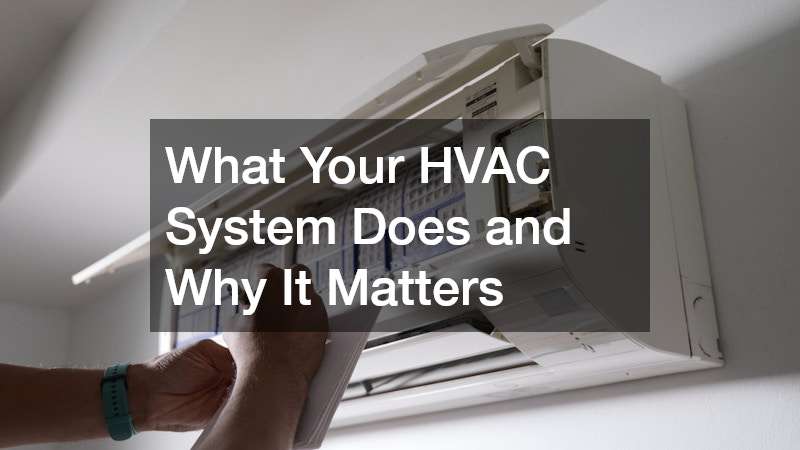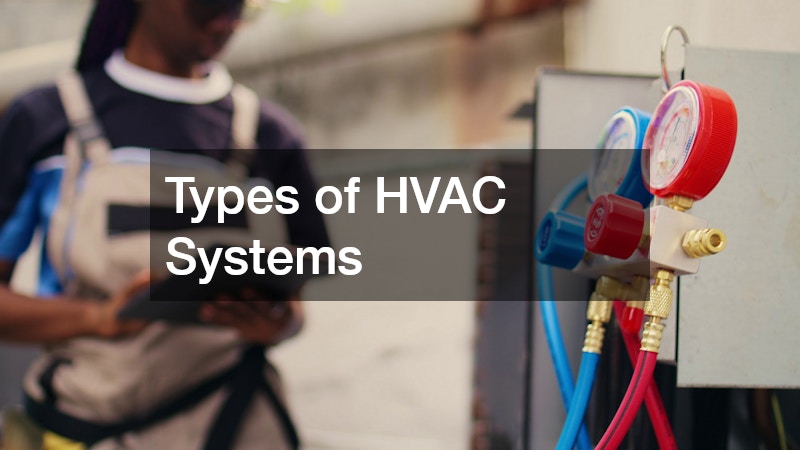
What Your HVAC System Does and Why It Matters
Understanding your HVAC (Heating, Ventilation, and Air Conditioning) system and getting the right HVAC contractors is crucial for maintaining home comfort, energy efficiency, and indoor air quality. This article provides insights into what an HVAC system does and why it plays a vital role in your daily life. A well-functioning HVAC system not only enhances living conditions but also contributes to health and financial savings.
How an HVAC System Works
Components of an HVAC System
An HVAC system is composed of several key components that work in unison to regulate your home’s climate. The furnace is crucial for heating, utilizing fuel to warm the air, which is then circulated throughout your home. The air conditioner, on the other hand, cools the air by removing heat, creating comfort during warmer months.
Ductwork forms an important network that distributes heated or cooled air to different rooms, ensuring consistent temperature throughout the house. The thermostat serves as the control center for the entire system, allowing you to set desired temperatures and manage energy usage. Understanding these components helps homeowners troubleshoot issues and optimize their system’s performance.
Each element of the HVAC system plays a specific role in climate control. For instance, without well-maintained ductwork, even the most efficient furnace or air conditioner cannot provide effective heating or cooling. Thus, awareness of these components is the first step to ensuring a comfortable and energy-efficient home environment.
The HVAC System Cycle
The HVAC system operates in distinct cycles to maintain the desired indoor climate. During the heating cycle, the furnace activates to warm the air, which is then distributed through ductwork into each room. When cooling is necessary, the air conditioner extracts heat from the indoor air, expelling it outside while circulating cooler air inside.
The ventilation aspect of HVAC ensures the circulation of fresh air indoors, crucial for maintaining good air quality and reducing indoor pollution. This cycle involves the intake of outdoor air, filtering it, and distributing it throughout the home. A regular cycle of ventilation, heating, and cooling is essential for balanced indoor climate regulation.
Why Regular HVAC Maintenance is Important
Benefits of Routine HVAC Maintenance
Regular HVAC maintenance brings numerous benefits, enhancing both system performance and longevity. Routine check-ups and cleanings ensure that components such as filters and ductwork remain clear of obstructions, facilitating efficient airflow. By optimizing efficiency, regular maintenance minimizes energy consumption and lowers utility costs, which can be significant over the long term.
Another key benefit is the extended lifespan of the HVAC system, which can prevent premature replacements and expensive repairs. Regular inspection allows technicians to identify and address minor issues before they escalate into major problems. This proactive approach helps homeowners avoid unexpected breakdowns that can lead to discomfort and emergency service costs.
Risks of Neglecting HVAC Maintenance
Failure to maintain an HVAC system can lead to various adverse effects, impacting both comfort and finances. Neglect can cause system components to wear out faster, leading to frequent breakdowns and expensive repairs or replacements. For instance, dirty filters reduce airflow efficiency, resulting in the system working harder and increasing energy bills significantly.
There are also health concerns associated with neglected HVAC systems. Poor maintenance can lead to inefficient air filtration, allowing dust, mold, and allergens to circulate indoors, exacerbating allergies and respiratory problems. Furthermore, neglected systems are prone to leaks and malfunctions, which can introduce harmful contaminants such as carbon monoxide into the home.
A lack of maintenance also means reduced reliability, with an increased risk of system failure during extreme weather conditions when climate control is most needed. This can result in discomfort and urgent service calls that are typically more costly than scheduled maintenance. Preventative care is therefore essential not just for comfort, but for safety and cost-efficiency as well.
Choosing the Right HVAC System for Your Home
Factors to Consider When Selecting an HVAC System
Choosing the right HVAC system involves various considerations to ensure optimal performance and cost-effectiveness. One important factor is the size of your home; a system that is too small won’t adequately regulate the temperature, while one that is too large will consume excessive energy. Climate is another significant factor, as the system must be capable of delivering consistent performance throughout seasonal changes.
Energy efficiency is crucial, often indicated by ratings such as SEER for air conditioners and AFUE for furnaces. Higher ratings usually translate to lower energy costs and less environmental impact. Budget constraints also play a role in the decision-making process, both in terms of upfront costs and long-term energy expenses.
Types of HVAC Systems
Several types of HVAC systems are available on the market, each designed to cater to different needs and preferences. Split systems, for instance, are the most common and consist of an indoor and an outdoor unit, offering a balance of performance and cost-efficiency. Hybrid systems provide an eco-friendly option, capable of switching between electrical power and fossil fuels to maximize efficiency.
Ductless mini-split systems are a versatile choice, ideal for homes lacking existing ductwork. These systems provide targeted heating and cooling to specific areas, allowing for greater control and energy savings. Geothermal systems represent an innovative approach, utilizing the earth’s consistent underground temperature to regulate home climate efficiently.
Your HVAC system is an integral part of home comfort and efficiency. Understanding how it works, maintaining it properly, and selecting the right system are essential steps toward ensuring a healthy living environment. By prioritizing regular maintenance and making informed choices, homeowners can enjoy enhanced comfort, financial savings, and improved indoor air quality.
